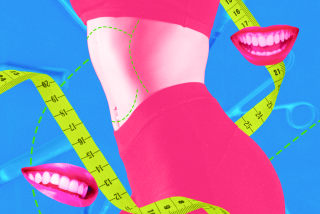Mothers, Daughters and Weight
- Share via
At a recent visit to her doctor, one mother of a teenage daughter had a concern. Her daughter was a little chubby, the mother said. She wanted to lose 10 pounds. What did the physician think of prescribing the latest hot diet drug, fen-phen, for her. Other parents were getting it for their daughters, she said. The physician refused.
“Fen-phen is not for people who want to lose 10 pounds, let alone for young women who haven’t fully developed,” said an adamant Dr. Carolyn Crandall, an internist at the Iris Cantor-UCLA Women’s Health Center.
But the bigger question here is just how far will mothers go to assure their daughters are thin?
Possibly too far.
“On average,” said Adam Drewnowski, professor of public health at the University of Michigan, “mothers want their daughters to be thinner. And the higher up the socioeconomic scale the family, the greater the concern with thinness.”
In his study of 2,000 girls ages 11 to 18 and 1,300 mothers conducted several years ago, he found that one in three girls was on a diet, and half of those dieting were doing so with their mother’s encouragement. In a separate study, he compared daughters of men with college educations and daughters of fathers without. The girls in the first group weighed on average 10 pounds less.
Dr. Michael A. Bush, an endocrinologist and medical director of the Cedars-Sinai Medical Center Weight Control Program, said what he sees corroborates that finding. “Partly because I work in West L.A., I do see a lot of moms personally driven for physical perfection, which makes them overly manic for slimmer more anatomically ideal daughters.”
In her work with young women and girls, Rebecca Manley, founder of the Massachusetts Eating Disorders Assn., found that girls not only dieted because their mothers did (dieting, like wearing perfume, was simply a part of becoming a woman), but also internalized their mother’s self-criticisms: “This makes me look fat.” “Ugh, I hate my thighs.”
If mothers convey this negativity toward their own bodies and undermine their daughters’ body confidence with remarks--Are you sure you need those chips? Do you know how many fat grams are in that? You would look just perfect if you lost a few pounds--the results are especially destructive, Manley said.
But if mothers encourage their daughters to better fit society’s ideal, isn’t that ultimately in the daughter’s best interests?
No. According to the experts, besides giving a child an unrealistic body image she may not shake for the rest of her life, these attitudes can be physically imperiling. Drewnowski said a clear correlation exists between early dieting and lifelong eating disorders, from self-starvation to obesity. In addition, encouraging girls to diet before they’ve fully matured can hamper their development.
“Women who grew up with thinness as the ideal may overly restrict their children’s diets,” Drewnowski said. “I ask a mom, ‘Does your child ever drink Coke or eat French fries?’ If she says, ‘No, I’d never let her eat that junk,’ I begin to wonder about the child’s caloric intake. A grown woman needs about 1,500 to 1,800 calories a day, but an active growing girl needs about 3,000.”
Much of this is tangled up with the daughter’s growth and puberty, a time when girls do put on weight, he added. “It’s not unusual for a girl to put on 15 pounds in six months due to maturation. This usually happens around 12.5 years of age but it can occur as early as 11.” So before moms push daughters into diets, they need to distinguish whether the weight gain is genuine obesity or developmental.
Bush concurred: “Kids grow in both directions. Some put on the weight before the growth spurt, others grow before they put on the weight.” In either case, respect the development, which to a large extent is determined by genetics.
Besides genes, two other factors ultimately determine our children’s body size, shape and weight, said Bush: what we do and what we say.
But, as anyone who has raised kids can tell you, the best intentions sometimes go awry--especially if you insist on behaviors that are too restrictive.
“If a mother forbids Fritos and cookies in the house, maybe because she felt overweight as a teen, the daughter will seek them out elsewhere and overeat,” Manley said. “The mother has made food a control issue.”
Manley, who teaches body confidence classes to girls from grades six to 12 across her state, would like mothers to better educate daughters. “Tell them what happens to the body during adolescence. How they will develop fat stores. Promote the diversity of body types. Get out your family photo album and talk about the body types in your family. Talk about how you felt about your body when you were growing up. What were healthy thoughts and behaviors and what wasn’t healthy. Save your daughters the pain of what you went through.”
Finally, Bush said, focus on the behavior, not the weight. “If your child is exercising and eating an appropriate diet, then let the chips fall.”






